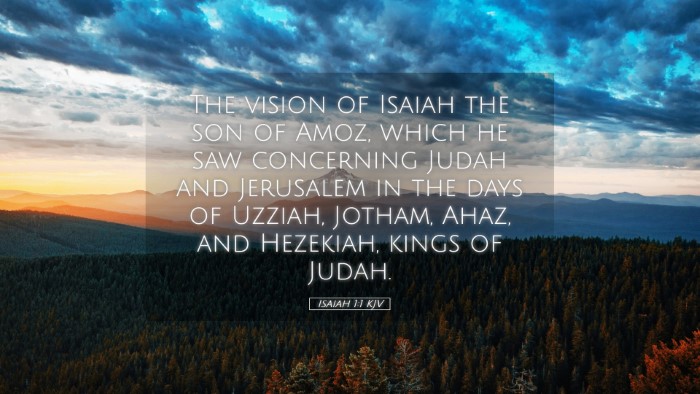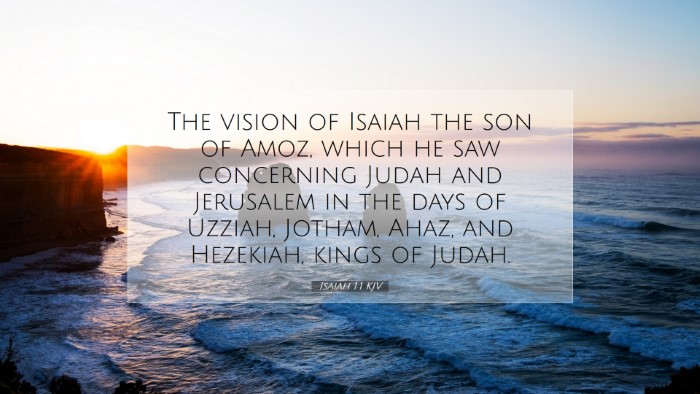Commentary on Isaiah 1:1
Introduction
The book of Isaiah, one of the major prophetic texts of the Old Testament, begins with a foundational verse: Isaiah 1:1. This verse sets the stage for the profound messages contained within the prophetic writings, detailing the visions and messages given to Isaiah during a critical period in Israel's history.
Text of Isaiah 1:1
"The vision of Isaiah the son of Amoz, which he saw concerning Judah and Jerusalem in the days of Uzziah, Jotham, Ahaz, and Hezekiah, kings of Judah."
Historical Context
Period of the Kings
- Uzziah: A king characterized by both prosperity and eventual downfall due to pride (2 Chronicles 26).
- Jotham: Notably a king who maintained the nation’s integrity but failed to eliminate idolatry (2 Kings 15:34-35).
- Ahaz: A ruler known for wickedness and for adopting idolatrous practices (2 Kings 16).
- Hezekiah: A king who brought about significant religious reforms and restored faithfulness to Yahweh (2 Kings 18:3-6).
The temporal context of these kings offers insight into the spiritual climate of Judah, which oscillated between reform and rebellion, faithfulness and unfaithfulness. This setting is critical for understanding the urgent messages that Isaiah relays.
Analysis of the Verse
“The vision of Isaiah”
Here, Isaiah categorically identifies his prophecies as visions, emphasizing that they originate from divine revelation rather than mere human insight. This vision is a profound spiritual encounter that holds significant weight in delivering God’s message to His people.
The Role of Isaiah
Isaiah is referred to as the "son of Amoz." His lineage is mentioned, which is significant in biblical tradition as it often serves to authenticate a prophet's message. Public domain commentaries, such as those by Adam Clarke, encourage a deeper understanding of the title of 'prophet' that bestows a solemn responsibility to convey God’s message faithfully.
Scope of the Vision
The vision concerns "Judah and Jerusalem." This specification highlights that the messages are directed toward the southern kingdom, indicating political and spiritual challenges unique to these places. The prophets often addressed societal injustices, leading to reflections on how the spiritual identity of these regions were crucial for their guidance and restoration.
The Importance of the Kings
The mention of the four kings establishes a timeline for Isaiah's ministry. Each king’s reign was marked by distinct religious and social conditions:
- Under Uzziah, there was great prosperity but also pride and a fall that symbolized the danger of human arrogance.
- Jotham’s reign bore witness to partial adherence to God's ways while still allowing idolatry to persist.
- Ahaz represented a low tide in faith, showcasing national decay due to foreign influences and disobedience.
- Hezekiah’s term was marked by a return to faith, where spiritual renewal was prominently restored.
Theological Implications
This opening verse implies the prophetic calling of Isaiah as one with the unique privilege and burden of conveying God's message amid turbulent times. As noted by Matthew Henry, a prophet’s role is not only to proclaim but also to enlighten the minds of their audience concerning God’s sovereign will, the urgency of repentance, and the promise of restoration.
Spiritual Lessons for Today
For modern readers, the relevance of Isaiah 1:1 extends beyond its historical context. It prompts reflection on the need for prophetic voices in contemporary society, urging believers to discern spiritual truths amidst chaos. The awareness of God’s voice amidst societal upheaval is particularly resonant, inspiring pastors, theologians, and scholars to actively engage with the texts of Scripture for spiritual and communal renewal.
Call to Reflection
Isaiah's vision calls today’s church to assess its spiritual state. Are we like Uzziah, indulging in pride? Or are we striving for a return to the faithfulness of Hezekiah? Such reflections can function as vital spiritual exercises for congregations seeking to align their practices with God’s intentions for justice, mercy, and faithfulness.
Conclusion
Isaiah 1:1 is not merely an introduction; it is a doorway into the depths of God’s heart for His people and the world. The visions that follow provide a rich tapestry of God’s promises, warnings, and calls to return to holiness. Engaging with this verse and its implications ensures that pastors, students, theologians, and Bible scholars are equipped to convey and embody the transformative message of the prophet Isaiah.


